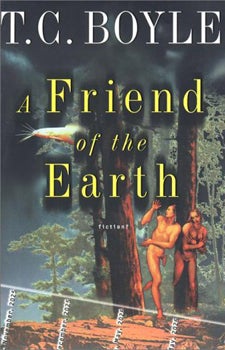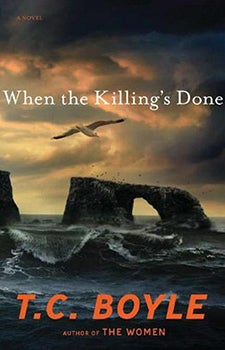T.C. Boyle to Receive Thoreau Prize
T.C. Boyle, USC Writer in Residence and Distinguished Professor Emeritus of English at USC Dornsife, has won a top prize for his exceptional talents in nature writing.
PEN New England will present this year’s Henry David Thoreau Prize for Literary Excellence to Boyle, who has written 24 books of fiction. The event will be held on May 7 at the Massachusetts Institute of Technology.
Merrill Balassone checked in with the prolific wordsmith.

A Friend of the Earth (Viking, 2000) is set in an America ravaged by global warming. (First edition cover.)
A Friend of the Earth is set in an America ravaged by global warming. When the Killing’s Done concerns invasive animals on the Channel Islands. Does the state of the environment keep you up at night or are you hopeful about the future?
In that I am a sleek, well-fed and well-exercised animal, I sleep beautifully. As for my concern about the environment, I try not exclusively to bring bad news. Yes, we are doomed — imminently. But awareness of environmental concerns is at the forefront of our thinking today, and so we seek to reduce carbon emissions, we try to stretch our water resources, we conserve, we recycle — all foreign notions 50 years ago. This is to the good. But it may be that we’ve already reached the tipping point and no matter what we do things are hopeless. Turn your face to the sky (after lathering on plenty of sunblock), unplug, enjoy what we have left.
How have your books been received by environmentalists?
Quite well, it seems. Many people in the movement, as well as many of the biologists I met in the wake of When the Killing’s Done, feel that fiction is a way of spreading awareness that may be more effective — or at least effective in a different way — than the usual warnings of environmental writers. I had the privilege of working with the biologists on Santa Cruz Island in their efforts to remove invasive species and monitor the health of the dwarf foxes and skunks. What a joy to be out there beyond sound and sight of man-made things and feel the pulse of the land.

When the Killing’s Done (Viking, 2011) concerns invasive animals on the Channel Islands.
Do you ever write outside? Are there particular natural places that inspire your writing? 

I never write outside, but only at my desk. Desks, that is. I write here in Santa Barbara and in a rented house at 7,200 feet in the Sequoia National Park. While writing, I can gaze out the window on nature, which can be soothing and distracting both, but for me it’s better than staring at a wall. I do, however, read in the outdoors, whether at the local beach or at the top of my favorite waterfall in the Sierras.
What are you currently working on?
I’ve finished a novel, The Harder They Come, which will be published next March. If my last novel, San Miguel, an historical drama set on the island of that name and narrated from the point of view of the three women who lived there, was intentionally hermetic (to reflect the quotidian life of people making a living off the land), The Harder They Come is the opposite. It’s set contemporaneously in the Northern California forests around Fort Bragg and deals with nature as a refuge from modern society, while at the same time tracing the roots of American anti-authoritarianism and violence. Currently, I am writing short stories, the first of which, “The Relive Box,” appeared in the March 17 issue of The New Yorker. Finally, I should say that I am especially pleased to be the recipient of the Thoreau Award in recognition of the environmental themes running through my body of work. It’s nice to know that somebody’s listening.